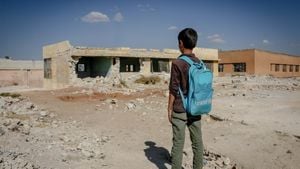Leaders of various Islamic organizations gathered at Navy Pier on Monday, urging politicians attending the upcoming Democratic National Convention to take action against the war ravaging Gaza. The event brought together community members who are frustrated with the seemingly endless violence and suffering.
Jenin Al Harithi, with American Muslims for Palestine Chicago, emphasized the need for Palestine to be recognized at the DNC, declaring, "The people's voices will be clear and unified, and Palestine will be on the agenda at the DNC." Such statements resonate with numerous Americans advocating for peace and justice.
Local organizers of peaceful marches and rallies have announced their plans for at least three events during the DNC, reinforcing their commitment to advocating for those impacted by the conflict. Abdulghany Hamadeh, from the Council of Islamic Organizations of Greater Chicago, was clear about their demands.
He stated, "We demand immediate actions, not just words," adding they want political leaders held accountable for the destruction caused by the conflict. The echo of these sentiments reflects the urgency felt within the community.
Ahmed Rehab, the Executive Director of CAIR Chicago, joined the call for peace, insisting on the necessity of "an immediate and permanent cease-fire to save these innocent lives." His remarks underline the critical situation many find themselves facing amid the conflict.
On Monday, concerns about rising hate crimes and potential conflicts surrounding the DNC were also highlighted, especially from local Jewish organizations. Their leaders expressed fears about the possibility of antisemitism erupting during the protests.
Syed Khan, representing the Illinois Islamic Action Network and Illinois Muslim PAC, urged unity among diverse communities. He pointed out, "Let us unite as one nation, for difference in religion, race, and color should not divide us; our strength is in unity through diversity."
Following the protests planned for the DNC, the city has seen discussions and preparations ramping up. Authorities have promised to maintain peace during the scheduled events and protests throughout the convention period.
The urgency for action against the escalating violence in Gaza has brought various organizations together, showing solidarity across different faiths. Many participants believe it's time for leaders to step up and make clear statements advocating for cease-fire and peace.
The protests planned during the DNC are expected to garner significant attention and demonstrate the strength of emotions surrounding the Gaza situation. This unrest reflects broader sentiments within the country, with growing pressure on political narratives as the conflict continues.
At the same time, the DNC indicates a pivotal moment for many organizations advocating for change. Their collective voice aims to push these critical issues onto the national stage.
Teaneck, NJ, is witnessing similar calls for action, as community members gather weekly at the National Guard Armory. The Teaneck Peace and Justice Vigil is set to hold its 990th session, maintaining its commitment to advocating for peace and justice.
Participants at the vigil are reminded of the importance of their voices and the strength of community organization, especially during these turbulent times. Their chants continue to resound with urgency, emphasizing the need for both cease-fire and arms embargo.
The gathering reflects not just local sentiments but contributes to the national discourse about violence and accountability as the conflict rages on. Organizers are urging for sustained attention and efforts to bring about constructive change.
Each of these efforts showcases the power of community solidarity and grassroots activism. The upcoming DNC could create opportunities for these voices to reach wider audiences and inspire broader action.
With headlines dominated by violence, many citizens are determined to change narratives surrounding the conflict. This movement pushes for not just awareness but sustained advocacy for peace.
On the broader front, various organizations and leaders continue to call for accountability from U.S. politicians, reflecting the urgency of the matter. They argue for immediately addressing both the humanitarian issues in Gaza and the root causes of conflict.
The pressure for change has increased exponentially as both domestic and international opinions shift. A significant sense of urgency arises as humanitarian crises have become impossible to ignore.
Peaceful protests and visuals of solidarity contribute to the growing global call for unity and collective responsibility. It resonates across communities, urging transformations on personal, societal, and political levels.
From Chicago's Navy Pier to NJ's Teaneck, these actions signal not just local resolve but also their commitment to global humanitarian principles. Communities are uniting, driven by compassion and the need for justice.
Through upcoming protests, local leaders aim to remind those with power about the moral dilemmas surrounding the war, underlining the importance of compassionate governance. This conversation is reaching both hallways of power and everyday neighborhoods.
Thus, as the DNC approaches, its backdrop will surely include these voices echoing for peace. The hope is for this national platform to trigger changes beyond typical rhetoric, turning desires for action to tangible outcomes.
Events at the convention could either reshape narratives or reinforce previously held positions based on actions taken or ignored. Therefore, the stakes remain simultaneously high for both the officials attending and the citizens watching.
These initiatives and planned protests symbolize neither desperation nor hopelessness but rather active engagement from communities striving for positive change. Through dialogue, advocacy, and relentless spirit, their collective resolve may very well shape the political discourse surrounding the Gaza conflict.
An engagement reflecting aspirations for both local and global change reveals the interconnectedness of issues ranging from human rights to political accountability. To many, peace isn't just about the absence of war, but also about justice and equal opportunities for the vulnerable.
The energy from these local actions encapsulates the growing global solidarity movements, as more citizens seek meaningful ways to participate. They are calling for each and every politician to recognize the weight of responsibilities they carry.
Those united against violence are amplifying their demands for justice, striving for outcomes not only for Gaza but for all oppressed communities facing similar predicaments around the world, ensuring their voices reverberate well beyond the confines of politics. During this DNC, the message will be clear - action is the only path to lasting peace.



